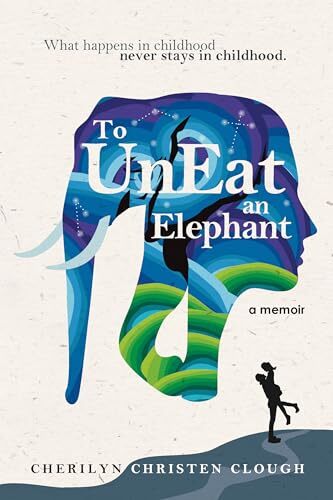To Un-Eat an Elephant, by Cherilyn Christen Clough

There’s a moment in this book, Cherilyn Christen Clough’s second memoir, where Cherilyn loses her temper at her brother’s girlfriend for describing their family as “dysfunctional.” As anyone who read Clough’s previous memoir, Chasing Eden, already knows, “dysfunctional” is a very apt descriptor that maybe doesn’t go far enough to describe the way in which Clough and her siblings were raised by their ultra-fundamentalist Adventist parents. Her reaction to that word in the context of the story she’s telling alerts the reader not that the brother’s girlfriend is wrong in her assessment, but rather, reminds us of how deeply enmeshed such family dynamics can be. Throughout this memoir, Cherilyn struggles to build an adult life apart from her family, but still feels tied to them by bonds of love, worry, fear, and duty.
To Un-Eat an Elephant picks up where Chasing Eden left off, with young adult Cherilyn leaving home for an Adventist college community — still a pretty conservative and sheltered place in the world’s eyes, but a place of endless possibilities for someone who grew up as the author did. Many memoirs about dysfunctional childhoods and abusive family dynamics end with the narrator breaking free: few take the reader through the next steps of the story. How do you grow up into a healthy, independent adult when your entire childhood has been so tightly controlled? How do you get an education and a career when you’ve never been to school or even properly homeschooled? And how do you strike the balance of maintaining some kind of relationship with parents and siblings you still love, while learning to create healthy boundaries?
Told in simple, straightforward language, this memoir traces that difficult journey. Cherilyn goes to college, gets a job, travels internationally with a Christian music ministry, falls in love and gets married — but becoming her own person is never easy, as she can never fully walk away from her family when she’s had it ingrained in her that she must “forgive and forget” everything they have done. Her unflinching honesty is unsparing: the author never paints herself as perfect, and reveals as many of her own mistakes and she does those of her family members. What emerges is an authentic portrait of someone struggling to emerge from her difficult childhood and discover herself. The memoir ends on a poignant note that alerts the reader that another piece of the story remains untold; I’m looking forward to the next volume.



